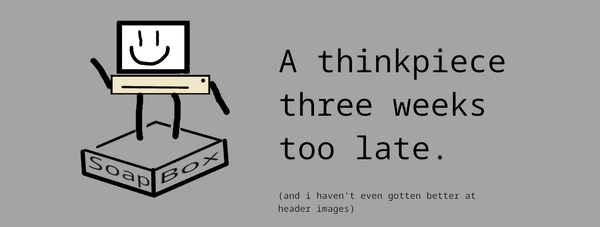It's about the community, not the platform
Reddit does not deserve accolades simply for existing.

I'm a subscriber to The Atlantic because they have a long history of thought-provoking stories on a wide variety of topics. I don't always agree with their writers, but their stories always (or often) at least give me something to think about.
The other day I saw an Atlantic article linked from a Bluesky post that for sure made me think.

You can find the article over here (gift link) if you're interested in reading it. Despite some of my gripes with it, it is a good read that makes its point pretty well.
It takes a specific view of Reddit as a platform (and the history thereof) that sits somewhere between "a broad view" and "cherry-picking." But ultimately it makes its main thesis pretty well:
...Reddit remains wildly original and startlingly generous, which is to say, deeply and gorgeously human. It provides connection to others, stokes curiosity, and—at least in some subreddits—leaves you with a feeling of time well spent, a rarity on other social platforms. Because as different as each Reddit community is, every good subreddit is irrepressibly captivating for the same reason: the people.
However, in my opinion, the rest of the article puts the emphasis on the wrong part of the thesis. Because it is about the people and the communities they build, not about Reddit as a platform.
It's even possible that the article strikes that balance better than my own biases have allowed me to see, but well here we are anyway.
So what's your problem?
I agree that it's remarkable that - in a world of algorithms feeding users a stream short-form and increasingly AI-generated content - Reddit still survives largely by allowing users to organize themselves into communities and generate their own content.
What set me off, though, was lines like
...Reddit, of all places, has developed a reputation as a force for good, or at least a force for reminding people of the promise of a decentralized open web.
Not because it's wrong. But because it doesn't interrogate that conclusion any further and instead seems to attribute these positive aspects to Reddit as a platform. Reddit reminds us that an open and decentralized web is good (or at least promising) and that's enough to deserve accolades despite not, itself, being open or decentralized.
Instead I posit that communities that persist on Reddit do so in spite of the platform, not because of it. Or maybe because of how the platform used to be rather than how it is now.
It's worth understanding why so many communities stick to platforms like Reddit and Facebook Groups, but also understanding what compromises they make when they do so. All in the pursuit of offering better and more ethical community-building tools and guidance.
Your community is owned by Reddit
While you may be able to moderate your subreddits day-to-day, make no mistake that your community belongs to Reddit. The company is extracting free labor from their moderators and free content from their users to create value for themselves and their shareholders. Maybe that's a free and fair exchange that everyone is happy with, but it's worth being explicit about and never losing sight of.
How risky it is for any given community depends on how Reddit is feeling and who is running the company. And that uncertainty is in itself part of that risk. Without re-litigating almost 20 years of administrative decisions blow by blow, Reddit has held different philosophies over the years on how "hands-on" it will get with subreddits.
You can find a fuller listing over on the Timeline of Reddit wikipedia page, but there are a couple of important events not shown there or not shown in full context.
In 2016, the then-CEO of Reddit manually edited a user's post that criticized him. Regardless of whose comment he edited and why he did it (you can see the link for more context), this is a huge breach of trust from Reddit against its users and unpaid community moderators.
And in 2023, Reddit was embroiled in lots of drama. They were looking to lock down access to their APIs and to start charging for types of access that had historically been free. There were a number of reasons for this, most that ultimately rolled up into "finally becoming profitable for our IPO." Which is fair enough. But it was also an object lesson in enshittification. This platform you've built your community on has, with minimal warning, drastically changed the rules.
These API pricing changes would effectively kill any third-party clients users were using, forcing them onto the official Reddit app. It also promised to kill lots of custom tooling that moderators came to rely on to manage their communities and keep their users safe. Eventually, several important moderation tools were given free API access, but other clients were still getting cut off.
In protest of these changes, moderators of many subreddits set their subreddits to "private." In response, Reddit threatened to remove moderators from these subreddits and replace them with compliant volunteers. In the end, Reddit did take over a few communities, removing the moderators (some were eventually reinstated).
Regardless of how you feel about Reddit's API changes, the protest actions, or the retaliation, this situation underscores something very important. When you run a community on Reddit, it is not owned by the community itself and it is not owned by the community's moderators - it is owned by Reddit. Moderators perform unpaid labor for the platform and users submit unpaid content to it (eventually to be gobbled up by AI tools like Reddit's own Reddit Answers).
When push comes to shove, those unpaid parties producing the value have no real power - all of the power is held by the platform.
What's wrong with that?
Unless you start with building your own ISP, you're always going to be beholden to someone for your access to the Internet. Datacenters, hosting providers, CDNs, and centralized application platforms can all decide to suddenly shut down your community for a million different reasons.
So it's all about evaluating risks and impacts and making your decision there. Reddit pretty regularly bans subreddits, and most high-profile bannings in the past have been for good reasons where the subreddits were in violation of Reddit's content policy regarding things like harassment, hate, and CSAM. But thinking about recent changes to Meta's Hateful Conduct policy, you can imagine how suddenly things like this can change.
Given the current climate in the US (because Reddit is a US-based company), would you today choose to start a subreddit for users to coordinate transportation for crossing state lines for reproductive healthcare? Would you start one for a peer support group for trans people dealing with hate and bullying?
These two things may very well exist, I'm not sure. And it's likely that right now, the benefits of building such a community where people can find it are greater than the risk of the community being shut down without warning. But we're already at the point where you need to think about it, right? You've seen how the rest of the platforms have folded?
Is your subreddit even a community?
Okay, I'm about to get all Internet curmudgeon on you. I'm sorry in advance. I mean no offense and I don't mean to suggest my opinions are superior.
I used Reddit heavily from 2007 through 2017. Then lightly/intermittently until the mobile client I was using stopped working in 2023. And never once did I feel like I was "part of a community." Even on smaller and more focused communities that I contributed to regularly. I recognized usernames sometimes, but I never had friends.
Now maybe I'm the outlier here, and that's fine. I know many people consider "people who have ever posted about [topic] on Bluesky" to be "the [topic] Bluesky community." But that's not me.
I think some of the more heavily moderated subreddits might meet my definition, but by and large Reddit suffers from the same community-building challenges as X or Bluesky. Being a global platform with millions of users and a couple of discovery feeds, the bulk of your community may end up being transient passers-by who happened to see a post on /r/popular or whatever it's called.
Maybe that's okay with you or actually what you're looking for, but it's not really what I think of when I hear community.
Okay but what should I do instead?
As you may have guessed, this is where things break down. There are no easy answers here because we've once again reached the confluence of tons of different issues with our consolidated Internet.
The gravity of these major platforms is both self-sustaining and reinforced by outside systems (how many of you habitually append site:reddit.com to your Google searches?). Escaping that gravity is not a simple task, nor a quick change. You're going to be fighting that gravity every step of the way.
Smaller, open, and more ethical replacements for community platforms like this come with their own baggage and hurdles. In 2023, people were leaving Reddit for the decentralized and open alternative Lemmy. Suddenly your community is met with all of the challenges of the Fediverse: discoverability issues, lackluster moderation/administration tooling, running your own server or choosing one owned by someone else, political baggage that may make some people uncomfortable. And you find yourself with literally the exact same calculus thinking about moving from Discord to Matrix.
Keeping things simpler and choosing something less complex like phpbb for forum or mattermost for chat still leaves you needing to find hosting and worrying about discoverability over major platforms.
Still more and more complex calculus to complete when all you really want to do is connect with people. But depending on the priorities and values you wish to instill in your community, important calculus to complete.
Wrap Up
So where does that leave us?
Well, for one, heartened that people are still building communities of a sort and finding connections even if the platform isn't ideal. It's nice to be reminded that people want to do more than scrolling through an infinite feed of ads and ads disguised as influencer posts.
But it's also a reminder of the tremendous gravity of corporate platforms. People need better and easier community-building tools and guidance if they are going to be able to escape.
The success of Bluesky and the more limited success of things like Mastodon, Lemmy, and Matrix makes it clear that the appetite is there and can provide a still-blurry vision of the future I'd like to see. But we're still a ways off.



![A poorly-drawn cartoon computer with a happy face on the monitor stands next to text: "Don't say tariffs [x4]...oops"](/content/images/size/w600/2025/04/dontsaytariffs.png)
